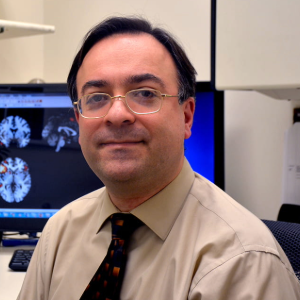
October 2024 Newsletter

October 2024 Newsletter

Faculty Profile
Borna Bonakdarpour, MD, is an associate professor of Neurology in the Division of Behavioral Neurology. His laboratory uses multimodal neuroimaging to study the underlying neural mechanisms of language impairment (aphasia) and impairment in other areas of cognition, and use this information to develop and evaluate effective treatments for aphasia. His lab also houses the Northwestern Music and Medicine Program, with focus on music-based interventions, clinical music programs, and music and medical education.
Bonakdarpour is a member of the Mesulam Center for Cognitive Neurology and Alzheimer's Disease, the Northwestern University Clinical and Translational Sciences (NUCATS) Institute, and the Osher Center for Integrative Health.
What are your research interests?
I have two main research interests. The first is neurobiology of language breakdown and rehabilitation in individuals with language impairments, known as aphasias. I have explored both stroke-related aphasia and language impairments caused by neurodegenerative diseases, such as Alzheimer's, known as primary progressive aphasias. My second area of research involves the use of music-based interventions for patients with neurological and medical conditions, as well as for enhancing the overall wellbeing of healthcare professionals.
What is the ultimate goal of your research?
For my research in aphasias, the ultimate goal is to understand the mechanisms underlying language breakdown to help us develop treatment strategies to help patients recover from communication barriers they face due to aphasias. For the music and medicine research, our goal is to understand the mechanism of action of music-based interventions and show their efficacy so they can be used as standard treatments for different diseases such as Alzheimer's disease, frontotemporal dementia and different conditions such as caregiver and healthcare worker stress.
How did you become interested in this area of research?
I was always fascinated in the way we humans communicate with each other through words and sounds (in the case of music). My doctoral dissertation focused on the rehabilitation of patients with aphasia using a music-based intervention known as Melodic Intonation Therapy. This project sparked my ongoing exploration of aphasia and music interventions throughout my research career.
How is your research funded?
My research has been funded through the National Institutes of Health, the National Endowment of the Arts, Alzheimer's Disease Center grants, the Osher Institute at Northwestern University and philanthropy.
What types of collaborations are you engaged in across campus (and beyond)?
I have used neuroimaging to investigate the structure and function of the brain through my research career and to measure changes due to disease conditions and in response to therapeutic interventions. I, therefore, have collaborated with many experts in neuroimaging on campus and beyond to name a few: Marsel Mesulam (my mentor), Todd Parrish (director of the Center for Translational Imaging), Michael Grecius (Stanford University) and Maya Henry (University of Texas Austin).
For my music-based intervention project, I have been able to collaborate with many eminent musicians and neuroscientists. I founded the Northwestern Music and Medicine Program in collaboration with Chicago Symphony Orchestra violist, music practitioner, an investigator, Clara Takarabe. I have also collaborated with many other Chicago musicians such as Frank Babbitt (Lyric Opera of Chicago), Joni Chan (pianist), and Chicago Baroque musicians Nathalie Colas and Brandon Acker. I am a member of the National Endowment for the Arts Sound Health Network and also an invited member of the NIH Music and Dementia Research Network, collaborating with Julene Johnson (UCSF), Pyche Loui (Northeastern University) and many others.
Where have you recently published papers?
I have published papers in Cortex, the Journal of Cognitive Neuroscience, Neurology, Alzheimer's Disease and Associated Disorders, and the Journal of Alzheimer's Disease.